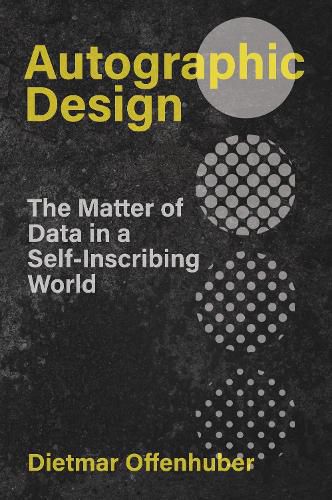Readings Newsletter
Become a Readings Member to make your shopping experience even easier.
Sign in or sign up for free!
You’re not far away from qualifying for FREE standard shipping within Australia
You’ve qualified for FREE standard shipping within Australia
The cart is loading…






An ambitious vision for design based on the premise that data is material, not abstract.
An ambitious vision for design based on the premise that data is material, not abstract.
Data analysis and visualization are crucial tools in today's society, and digital representations have steadily become the default. Yet, more and more often, we find that citizen scientists, environmental activists, and forensic amateurs are using analog methods to present evidence of pollution, climate change, and the spread of disinformation. In this illuminating book, Dietmar Offenhuber presents a model for these practices, a model to make data generation accountable- autographic design.
Autographic refers to the notion that every event inscribes itself in countless ways. Think of a sundial, for example-a perfectly autographic device that displays information on itself. Inspired by such post-digital practices of visualization and evidence construction, Offenhuber describes an approach to visualization based on the premise that data is a material entity rather than an abstract representation. Emerson wrote, "Every act of the man inscribes itself in the memories of his fellows, and in his own manners and face." In Autographic Design, Offenhuber introduces a model for design that emphasizes traces, imprints, and self-inscriptions, turning them into sensory displays.
In an age where misinformation is harder and harder to identify, Autographic Design makes an urgent and persuasive case for a different approach that calls attention to the production of data and its connection to the material world.
$9.00 standard shipping within Australia
FREE standard shipping within Australia for orders over $100.00
Express & International shipping calculated at checkout
Stock availability can be subject to change without notice. We recommend calling the shop or contacting our online team to check availability of low stock items. Please see our Shopping Online page for more details.
An ambitious vision for design based on the premise that data is material, not abstract.
An ambitious vision for design based on the premise that data is material, not abstract.
Data analysis and visualization are crucial tools in today's society, and digital representations have steadily become the default. Yet, more and more often, we find that citizen scientists, environmental activists, and forensic amateurs are using analog methods to present evidence of pollution, climate change, and the spread of disinformation. In this illuminating book, Dietmar Offenhuber presents a model for these practices, a model to make data generation accountable- autographic design.
Autographic refers to the notion that every event inscribes itself in countless ways. Think of a sundial, for example-a perfectly autographic device that displays information on itself. Inspired by such post-digital practices of visualization and evidence construction, Offenhuber describes an approach to visualization based on the premise that data is a material entity rather than an abstract representation. Emerson wrote, "Every act of the man inscribes itself in the memories of his fellows, and in his own manners and face." In Autographic Design, Offenhuber introduces a model for design that emphasizes traces, imprints, and self-inscriptions, turning them into sensory displays.
In an age where misinformation is harder and harder to identify, Autographic Design makes an urgent and persuasive case for a different approach that calls attention to the production of data and its connection to the material world.